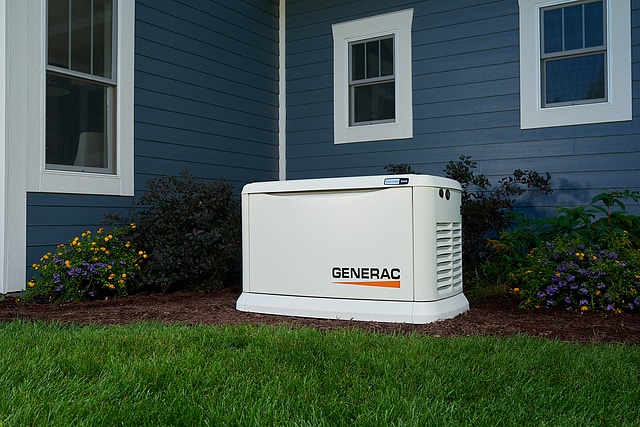A natural gas standby generator sits in a location beside your home and is permanently connected to your Walton Gas line.
Be Prepared with a Standby Generator
When a summer storm rips through Georgia, a loss of electricity sometimes comes with it. Most of these outages last only a few minutes or hours, but some storms that have occurred in recent years have left people in the dark for several days at a time. Investing in a natural gas standby generator can provide comfort, security and convenience in the event of such an emergency.
Walton Gas customers who use a natural gas stove and water heater will still be able to cook and have a hot bath in the event of an electricity outage. But if you have essential home appliances or medical equipment needing electricity to operate, adding a natural gas standby generator can ensure on-demand, dependable energy when it’s critical.
A natural gas standby generator can ensure
on-demand, dependable energy.
A natural gas generator can use your existing Walton Gas line to generate electricity. It sits in a location beside your home and is permanently connected to your Walton Gas line. It is also connected directly to your home’s electrical panel to provide uninterrupted backup in the event of an electricity outage.
Installing a standby generator is a big investment, so you’ll want to be well educated about your needs and the products available before making a purchase, said Keith Wasula, national account manager for generator manufacturer Generac.
Before you begin visiting dealers or reviewing products, here are four things he suggests you think about when determining which standby generator is right for your home:
CONDUCT a power audit.
How much backup power will your generator need to supply during an outage? Do you want to only back up crucial systems like refrigerators and air conditioning, or keep the entire house running as usual? Before you can select a generator, you’ll need to conduct a power audit of your home to determine the capacity you’ll require.
To get an idea of how much electrical capacity you’ll need, use an online generator sizing calculator such as this one available from Generac.
Decide whether you want to operate your central air conditioner or HVAC equipment during a blackout.
One of the main things you’ll want to decide is whether you’ll operate your central air conditioner or HVAC equipment during a blackout since it is one of the most power-hungry appliances in your home. Keep in mind that during Georgia’s summer months, a sweltering blackout could make life miserable, and an ice storm in the winter could crash your holiday plans.
Walton Gas tip: Consult a professional for an accurate electrical load analysis before making a generator purchase.
CALCULATE amps.
Just like a light bulb needs a switch to turn on, your generator needs one too. It’s very important to match the generator’s switch to the amps your home consumes.
A standby generator’s automatic transfer switch automatically springs into action the moment a power failure is detected. It continuously senses utility power and, if an outage is detected, it simultaneously starts the engine, disconnects power coming from the line, and energizes your home’s panel through generator power.
The average sized home has a 200-amp main breaker, so the maximum amount of electricity your home can consume is 200 amps.
Selecting the right switch requires knowing the amerpage of your electrical service panel. You’ll find this information imprinted on the main circuit breaker in your home’s main electric service panel. Typically, the average sized home has a 200-amp main breaker, so the maximum amount of electricity your home can consume is 200 amps. Smaller, older homes may have 100 to 150-amp service.
Walton Gas tip: A transfer switch is an essential safety measure. Ask your generator installer to verify that you have the right switch before installation begins. NEVER skip the transfer switch and connect a generator directly to your home’s service panel. This dangerous choice could “fry” appliances or damage an expensive generator. Far worse, it could endanger utility workers who might be working on power lines.
DETERMINE monitoring preferences.
Some standby generator manufacturers, such as Generac, now offer models with a remote monitoring feature. This allows a consumer to check on the status of a home generator on a phone, tablet or computer from anywhere in the world. If having easy access to information, such as the generator’s current operating status and maintenance alerts, is important to you, be sure to look for models with this option.
PLAN ahead.
Don’t wait until a major storm has been forecast to order your standby generator. The generator installation process may take up to a few weeks to complete — especially during the busy summer months. Try to do it during the spring or fall, before you need it (and, more importantly, before everyone else needs it!).
Once you’ve purchased a standby generator that’s right for your needs and scheduled an installer, sit back and relax. Your home will soon be protected against power outages of every kind.
